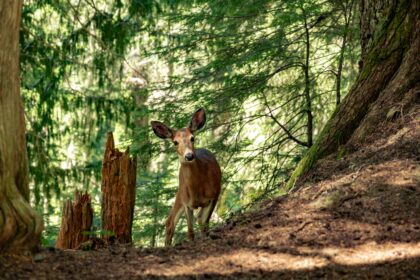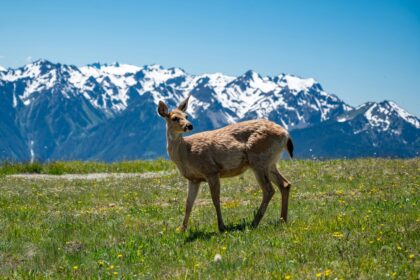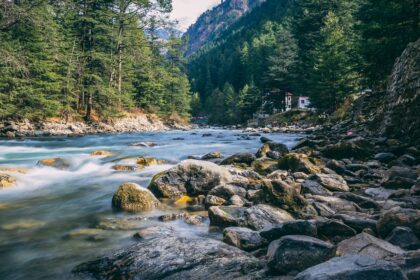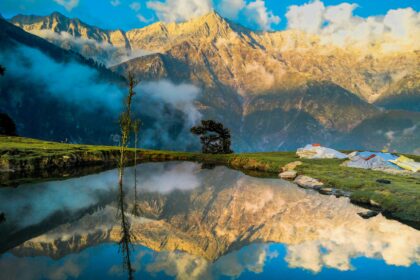In an age where travel often means ticking off crowded landmarks, trekking & hiking tourism offers a refreshing alternative—one that’s rooted in nature, self-discovery, and adventure. Whether you’re scaling Himalayan peaks, wandering through alpine meadows, or tracing ancient forest trails, trekking & hiking tourism invites you to slow down, breathe deeply, and connect with the world in its rawest form. These journeys aren’t just about reaching a destination—they’re about embracing the path.
🏔️ India’s Best Trails for Trekking & Hiking Tourism
India is a treasure trove for trekking & hiking tourism, with trails that cater to every skill level:
- Valley of Flowers (Uttarakhand): A UNESCO World Heritage Site, this moderate trek takes you through a vibrant alpine valley bursting with wildflowers and rare fauna.
- Triund Trek (Himachal Pradesh): Ideal for beginners, this short hike near Dharamshala offers panoramic views of the Dhauladhar range and a magical sunset.
- Chadar Trek (Ladakh): A winter expedition over the frozen Zanskar River, this is one of India’s most extreme and visually stunning treks.
- Sandakphu Trek (West Bengal–Sikkim border): Known for views of four of the world’s five highest peaks—Everest, Kanchenjunga, Lhotse, and Makalu.
- Kumara Parvatha (Karnataka): A challenging trail through dense forests and steep ascents, popular among South Indian trekkers.
These treks are often included in curated packages with guides, permits, meals, and camping gear—making trekking & hiking tourism accessible and safe.
🌍 Global Destinations for Trekking & Hiking Tourism
Beyond India, trekking & hiking tourism thrives in breathtaking landscapes across the globe:
- Inca Trail (Peru): A historic route leading to Machu Picchu, combining archaeology with mountain scenery.
- Tour du Mont Blanc (France–Italy–Switzerland): A multi-day circuit around the Mont Blanc massif, offering alpine villages and glacier views.
- Milford Track (New Zealand): Known as the “finest walk in the world,” this trail winds through fjords, waterfalls, and rainforests.
- Torres del Paine (Chile): Patagonia’s crown jewel, with dramatic peaks, turquoise lakes, and wild terrain.
- Mount Kilimanjaro (Tanzania): Africa’s highest peak, this trek is both challenging and deeply rewarding.
These international trails are supported by well-developed tourism infrastructure, including lodges, porters, and multilingual guides.
🧭 Types of Trekking & Hiking Tourism Experiences
Trekking & hiking tourism isn’t one-size-fits-all. There are formats to suit every traveler:
- Day hikes: Short trails like Rajmachi Fort (Maharashtra) or Parvati Valley walks are perfect for weekend getaways.
- Multi-day treks: Ideal for those seeking immersion, with overnight camping and gradual altitude gain.
- Pilgrimage treks: Routes like Kedarnath, Amarnath, and Hemkund Sahib blend spirituality with adventure.
- Eco-treks: Focused on sustainability, these include nature education, local homestays, and minimal impact practices.
- Luxury treks: Offer curated experiences with gourmet meals, glamping tents, and wellness add-ons.
Whether you’re a solo traveler, a couple, or part of a group, trekking & hiking tourism can be tailored to your pace and preferences.
🏕️ Stays and Campsites That Elevate the Experience
Accommodation during trekking & hiking tourism ranges from rustic to refined:
- Mountain lodges in Nepal, Bhutan, and Himachal offer warm beds, local meals, and stunning views.
- Tented camps in Ladakh, Spiti, and Uttarakhand provide immersive wilderness experiences.
- Homestays in remote villages offer cultural exchange and authentic hospitality.
- Glamping options in places like Rishikesh and Coorg combine nature with luxury.
These stays often include local guides, organic food, and eco-friendly practices—enhancing both comfort and connection.
🥾 Gear and Preparation Tips
To make the most of trekking & hiking tourism, preparation is key:
- Footwear: Invest in sturdy, waterproof hiking boots with ankle support.
- Clothing: Layer up—base, insulation, and waterproof outerwear. Avoid cotton.
- Essentials: Carry a daypack, hydration system, snacks, sunscreen, and a first-aid kit.
- Fitness: Start training a few weeks in advance with cardio and strength exercises.
- Permits and insurance: Many treks require government permits and travel insurance—especially in high-altitude zones.
Most tour operators provide gear checklists and pre-trek briefings to ensure safety and readiness.
📅 Best Seasons for Trekking & Hiking Tourism
Timing matters when planning your trek:
- Spring (March–May): Ideal for Himalayan treks with blooming rhododendrons and clear skies.
- Summer (June–August): Great for high-altitude routes like Ladakh and Spiti.
- Autumn (September–November): Crisp air and post-monsoon greenery make for perfect hiking conditions.
- Winter (December–February): Snow treks like Kedarkantha and Dayara Bugyal offer magical landscapes but require extra preparation.
Always check local weather and trail conditions before booking.
🌿 Sustainability and Responsible Trekking
Trekking & hiking tourism thrives on pristine environments. Responsible travel ensures these trails remain beautiful:
- Leave No Trace: Pack out all waste, avoid single-use plastics, and respect wildlife.
- Support local communities: Hire local guides, stay in village homestays, and buy regional products.
- Stay on trails: Prevent erosion and protect fragile ecosystems.
- Educate yourself: Learn about local flora, fauna, and cultural practices.
Many tour operators now include sustainability briefings and carbon-offset options in their packages.
🧳 Why Choose Trekking & Hiking Tourism?
Trekking & hiking tourism offers more than just scenic views—it’s a transformative experience:
- Reconnect with nature and escape digital distractions.
- Challenge yourself physically and mentally in rewarding ways.
- Discover remote cultures and ancient traditions.
- Build resilience and mindfulness through slow travel.
Whether you’re chasing summits, wandering through forests, or walking ancient paths, trekking & hiking tourism invites you to explore the world with purpose, curiosity, and respect.





